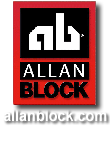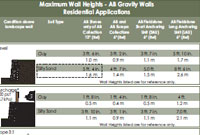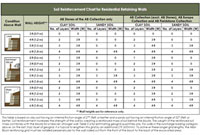Designing Your Retaining Wall
What Type of Retaining Wall Do I Need?
The first step is to determine whether you need a gravity wall or reinforced wall.
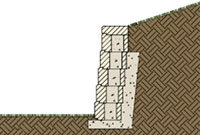
Gravity Wall
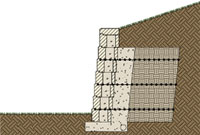
Reinforced Wall
Gravity Wall
Gravity walls rely on their own weight and setback to hold up the soil behind them. Learn more about gravity wall construction.
**Please note that the gravity wall chart provided has specific heights for specific site and soil conditions. If you are not sure of your site conditions we recommend being conservative with your retaining wall heights or use geogrid in your retaining wall. See our Soil Reinforcement Chart.
Reinforced Wall
Reinforced walls use layers of geogrid to combine the soil and block together to form a reinforced soil mass.
Under certain conditions, the block weight and setback alone do not provide enough structural support. This is where geogrid comes in - Allan Block’s Reinforcement Grid™ provides a simple solution by creating a solid structure with more resistance to soil pressure and surcharges for retaining walls under 6 ft. (1.8 m) tall. Learn more about reinforced retaining wall construction.
Conditions Above and Behind the Retaining Wall
Conditions above and behind the retaining wall will determine how tall the retaining wall can be before reinforcement is needed.
Slopes
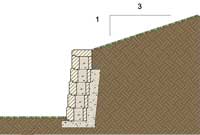
Slope above retaining wall
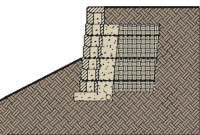
Slope below retaining wall
A slope above a retaining wall will add more pressure and weight, while slopes below the retaining wall may make the wall unstable due to sliding or erosion. Avoid slopes greater than 3 to 1 without first consulting a local engineer.
How to Mark and Measure Your Slope
Surcharges
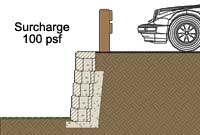
Surcharges
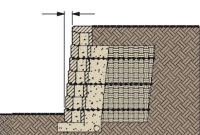
Setback
Any added weight above a retaining wall is called a surcharge. Patios, swimming pools and driveways are common residential surcharges. Your wall may need additional support if a surcharge is present.
Setback
The amount your wall leans into the hill is called “setback”. AB blocks come in approximate setbacks of 6° and 12°. The 12° (Ref) setback will provide better leverage and require less reinforcement.
Check out the Soil Reinforcement Chart to find out how much geogrid reinforcement your project will need.
Note: For commercial applications contact a local engineer.

